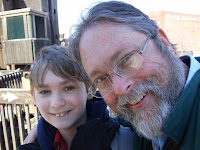The term “transformation” can be confusing. It means a thorough and dramatic change but
it’s not necessarily a sudden one. In fact most major changes are hard won,
taking years of work and learning.
I walked across a stage and picked up a diploma, first
for high school, then for college, then for grad school. But the ceremonies did not transform me. The changes came in the classrooms, in the
library, in my living room chair where I read, and at my computer where I
wrote. A business person may be recognized for a major achievement, however the
award is not what made this person accomplished—it was in the doing, growing,
and learning. Likewise, the athlete doesn’t suddenly become great when the Olympic medal
is awarded but only after arduous years of practice and
effort.
You understand what I mean. Yet when it comes to matters
of spirituality, many of us look for the quick change. We think major change is
supposed to happen in a miraculous moment with a fast prayer or some other
religious ceremony, or perhaps merely a return to church attendance. But change
usually happens gradually, requiring much time in meditation, self examination, and
study. Learning, spiritual awareness,
maturity, healing, virtuous living—these all take time and growth.
On the day of Pentecost, we read that the wind blew, the
flames rested over the disciple’s heads, and the Word was spoken in every
language. It all looked instantaneous,
but Luke says that these events had been part of God’s plan from the
beginning of time. Pentecost was not a
quick transformation, but rather an event marking the beginning of a new
covenant with God. And yet, even though
this was the result of much preparation, it was also the beginning of another long
growth process of the church, one in which we are still engaged.
Want big changes in your life? They begin with one step.
But it is only a first step.
Life is full of first steps.






